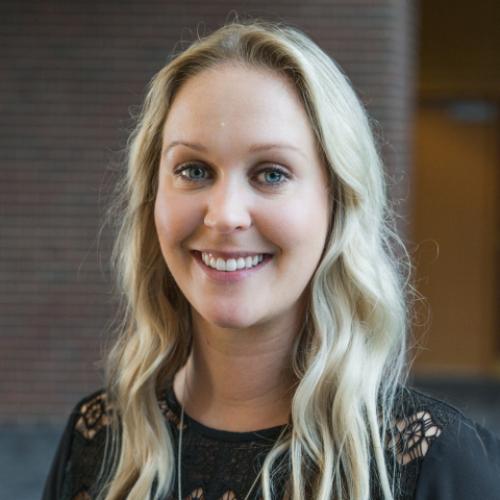Alumni Spotlight, Featuring Mackenzie Shipley
In this edition of BMB’s Alumni Spotlight, we feature Mackenzie Shipley, Ph.D.

Mackenzie is currently a Scientific Project and Alliance Manager at the Allen Institute for Immunology. She began her post-secondary education at Hartwick College, in Oneonta New York, where she majored in Chemistry. While a student at Hartwick, Mackenzie engaged in internships at Brookhaven National Laboratory during the summers of 2011, 2012, and 2013. There she studied environmental chemistry and gas chromatography under the guidance of both Richard Benner, Ph.D. and Thomas Watson, Ph.D. In 2013 she earned her Bachelor of Science degree in Chemistry.
Wanting to continue her education ever further, Mackenzie decided to cross state lines and attend Penn State for her graduate education. She found a home within the Department of Biochemistry and Molecular Biology’s Biochemistry, Microbiology, and Molecular Biology (BMMB) Program. While in the BMMB Program she entered the laboratory of Associate Professor of Biology, and Biochemistry and Molecular Biology, Moriah Szpara. Under her guidance Mackenzie learned from her many years of research experience in the field of virology. In 2018, after just over 5 years, Mackenzie successfully defended her thesis and earned her Doctor of Philosophy (Ph.D.) degree.

For her postdoctoral fellowship, Mackenzie conducted viral immunology research at the Fred Hutchinson Cancer Research Center in Seattle Washington. She spent a little under three years there learning from HIV Researcher, Julie Overbaugh.
Recently, Mackenzie accepted a new position at the Allen Institute for Immunology in Seattle, Washington.
You can follow Mackenzie on LinkedIn.
Let’s chat with Mackenzie, talk about her experiences while at Penn State, what inspires her, and catch up with what she’s been up to.
What is it that you do at the Allen Institute for Immunology?
I facilitate and organize the technical and operational aspects of joint research projects and clinical studies between the Allen Institute for Immunology and our external partners (including organizations like Fred Hutchinson Cancer Research Center, University of Pennsylvania, and Benaroya Research Institute).
What is it that inspires you to get up each morning, go to work, and do what you do?
The research areas that we as an institute are focused on are exciting because they include some of the most critical human diseases in the world - cancer, autoimmunity, and now, COVID-19. Not only do I get to work with outstanding people who are smart, engaging, and kind, but the scientific methodologies and tools that we are using to approach these problems are groundbreaking - including many large-scale multi-omic technologies that when collated together, leverage the strength of a systems biology approach. The prospect of having a translational impact with the work that we are doing is in and of itself extremely inspiring.
What was it that made you want to come to Penn State, and BMB, to pursue your education?
Penn State’s BMB program did not feel restrictive - in fact, I felt that I had access to a lot of exciting interdisciplinary research that not only was cutting edge, but that was also happening in a very supportive and collaborative environment.
How do you feel Penn State, and BMB, prepared you for your current position or career?
Penn State and BMB prepared me for my career because I had exceptional mentorship from multiple people at Penn State, namely my PI Dr. Moriah Szpara, as well as from several members of my dissertation committee, and a number of trainees within BMB and across the Millennium Science Complex building. I feel privileged to have had several forums to present and share my research, learn about other scientific fields, and meet new people during my time at Penn State. I think that my collective experience prepared me well for a fruitful scientific career in which I get to interface with people from all different facets of science on a daily basis - industry scientists, hospital clinicians, statisticians, software developers, and academic faculty.

Did you conduct research while at Penn State? Where was your research conducted and what was its focus?
I conducted my doctoral research in Dr. Moriah Szpara’s laboratory where I studied herpes simplex virus genomics and neurovirology.

in Spain.
Share at least one interesting/fun fact about yourself.
I’ve traveled to Spain twice to play in an international soccer tournament - at ages 14 and 17.
The most famous person I’ve ever met was Barack Obama - it was in 2007 in Washington, D.C. before he became the President. I was in town for a National Young Leaders Conference and we met in the tunnels beneath the Capitol building.
What do you like to do when you’re not at work?
I enjoy all things outdoors - particularly hiking, playing soccer, camping, and kayaking. I’m also very into cooking, traveling, and cheering on my favorite sports teams (Arsenal, Seattle Sounders, Seattle Seahawks, Penn State, OL Reign, Seattle Kraken, Seattle Mariners, Newcastle, and to my husband’s delight, the Green Bay Packers).
I’ve recently been volunteering as a mentor for Científico Latino’s Graduate Student Mentorship Initiative. This program aims to help underrepresented students who are interested in applying to graduate or medical school by pairing them with STEM professionals in their respective STEM disciplines. Many of these students are first-generation college students and some are international students as well.

before conducting an infectious B cell sort from an HIV+ PBMC sample.
Advice from Mackenzie to future generations of scientists:
One saying that has helped me throughout my scientific career is “you are not your data” - meaning that your worth as a scientist and a person is so much bigger than just whether you get into graduate school, or ace the test, or publish the paper, or get the job. Your worth is measured in how you choose to live your life and treat others. So don’t get hung up on all the small stuff. Life has a way of working out and nobody’s “path to scientific success” is ever straight or the same as someone else’s.